.cnn_html_media_utility::before{color:red;content:’>>’;font-size:9px;line-height:12px;padding-right:1px}
.cnnstrylccimg640{margin:0 27px 14px 0}
.captionText{filter:alpha(opacity=100);opacity:1}
.cnn_html_slideshow_media_caption a,.cnn_html_slideshow_media_caption a:visited,.cnn_html_slideshow_media_caption a:link,.captionText a,.captionText a:visited,.captiontext a:link{color:#004276;outline:medium none}
.cnnVerticalGalleryPhoto{margin:0 auto;padding-right:68px;width:270px}
]]>
Editor’s note: Vava Tampa, a native of Congo, is the founder of Save the Congo, a London-based campaign to tackle “the impunity, insecurity, institutional failure and the international trade of minerals funding the wars in Democratic Republic of the Congo.” Follow Vava Tampa on twitter: @VavaTampa
(CNN) — If humanitarian crises were listed by some sort of moral — or editorial — standards on the stock exchange, to help indicate which ones urgently require international news coverage and political action, shares of the situation in the Democratic Republic of the Congo (DRC) would have commanded international news headlines and extensive press coverage over the past 12 years.
The U.N. has labeled the DRC, Africa’s second largest country, as the “rape capital of the world” because of the pace and scope of the use of rape as a weapon of war by proxy militia gangs fighting for control of Congo’s easily appropriable and highly valuable natural resources, destined for sale in Europe, Asia, Canada and the United States.
The wars in that country have claimed nearly the same number of lives as having a 9/11 every single day for 360 days, the genocide that struck Rwanda in 1994, the ethnic cleansing that overwhelmed Bosnia in the mid-1990s, the genocide that took place in Darfur, the number of people killed in the great tsunami that struck Asia in 2004, and the number of people who died in Hiroshima and Nagasaki — all combined and then doubled.

Yet we rarely hear anything about it. Indeed, one only need contrast media coverage of the latest Israeli airstrikes on the Gaza strip and Hamas rocket attacks into southern Israel, which have made front pages around the world, to the stunningly limited media coverage afforded to graphic accounts of atrocities committed that same week by M23, the newest militia gang terrorizing the local population.
The same trend has been observed in the extensive coverage of the on-going, fast-moving and difficult-to-report civil war in Syria, which has claimed nearly 40,000 lives.
M23’s murderous campaigns to besiege Congo’s eastern mineral-rich provinces of North and South Kivu have left over 200,000 people in terrible conditions, killed countless and ushered in a dire humanitarian transgression.
The Rwandan government has been accused by the United Nations of backing M23 by providing it with arms, support and soldiers, but Rwanda’s President, Paul Kagame, has denied the allegation.
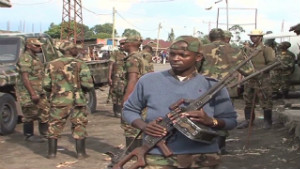 Rebels advancing in Congo
Rebels advancing in Congo
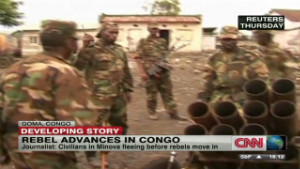 Refugees flee from rebels in Congo
Refugees flee from rebels in Congo
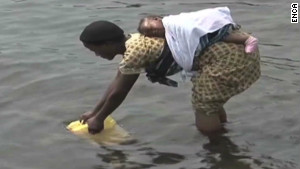 Life in Goma amid crisis
Life in Goma amid crisis
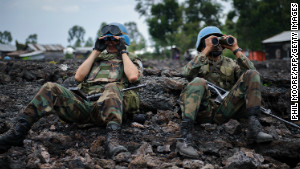 Congolese rebels take over Goma
Congolese rebels take over Goma
The question here is not whether the human suffering in Congo deserves more media coverage because it is greater than that in Syria or Gaza, but rather, why has the crisis in Syria or Gaza qualified for extensive media coverage, but not the killing and raping industries in Congo?
I doubt that this is because of a shortage of sobering imagery of Congo’s killing fields or a lack of first-hand testimonies from survivors, or a lack of human rights and humanitarian reports and assessments of the situation.
Is it due to the geographical or cultural distance between London or Washington and Congo? Or are Western media just reluctant, if not uninterested, to cover it because no Western interests or ally is endangered by it?
Would the coverage the situation in Congo receives be the same if it was happening in Europe or if Congo spoke English rather than French?
What if Robert Mugabe of Zimbabwe or his disciples were implicated in funding murderous militia gangs in Congo? Or if the killing was between black Africans and Arabs? Or if minerals funding Congo’s killing and raping industries benefited the East more than the West?
But as an activist, I believe that the editors of news organizations such as CNN, Al Jazeera and the BBC must flood the airwaves with vivid images and news stories on the human sufferings in Congo. Newspapers such the Guardian, in the UK, and the New York Times must drumbeat front-page news stories on the wars and human tragedy engulfing that country.
Unless they tip that balance a little and force policy makers in Washington and internationally to pay more attention and act, the killing, raping and looting that have thus far claimed over 5.4 million Congolese lives, and continue to leave 1,100 women raped every single day, could continue to unfold undetected by the camera lenses of Western media and excluded from Western political agenda.
The opinions expressed in this commentary are solely those of Vava Tampa.
Source Article from http://edition.cnn.com/2012/11/27/opinion/congo-war-ignored-vava-tampa/index.html?eref=edition
Views: 0
 RSS Feed
RSS Feed

















 November 30th, 2012
November 30th, 2012  FAKE NEWS for the Zionist agenda
FAKE NEWS for the Zionist agenda 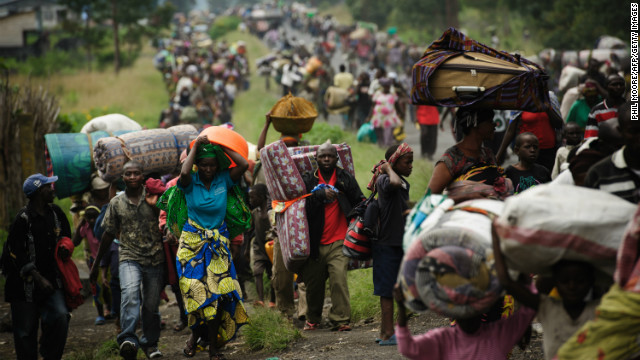 The M23 rebel group is fighting the Democratic Republic of Congo military for control of the country, and the violence is driving tens of thousands of Congolese out of their homes. Here on November 22, thousands fled the town of Sake and headed east to the camps for displaced in the village of Mugunga.
The M23 rebel group is fighting the Democratic Republic of Congo military for control of the country, and the violence is driving tens of thousands of Congolese out of their homes. Here on November 22, thousands fled the town of Sake and headed east to the camps for displaced in the village of Mugunga.
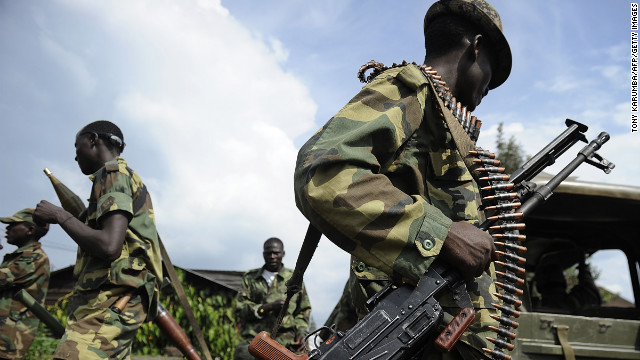 On November 26, M23 commanders refused to leave the city of Goma ahead of a midnight deadline imposed by regional leaders and the African Union. Pictured, rebel soldiers stand guard at the former Congolese army headquarters in Goma, on November 23, 2012.
On November 26, M23 commanders refused to leave the city of Goma ahead of a midnight deadline imposed by regional leaders and the African Union. Pictured, rebel soldiers stand guard at the former Congolese army headquarters in Goma, on November 23, 2012.
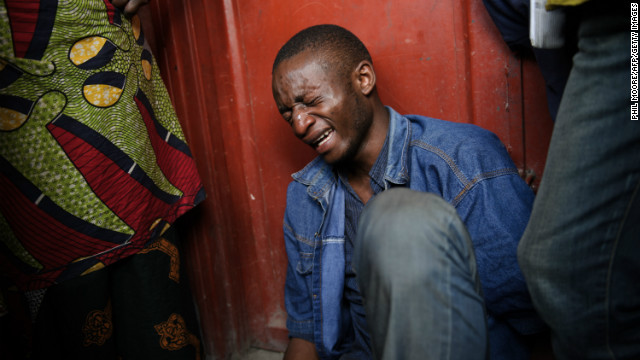 Lokuli Loleko Prince finds the body of his father in Goma on November 21, 2012. Lokuli’s father, a government military doctor, was killed in fighting between the government army and M23 rebels as they took the provincial capital.
Lokuli Loleko Prince finds the body of his father in Goma on November 21, 2012. Lokuli’s father, a government military doctor, was killed in fighting between the government army and M23 rebels as they took the provincial capital.
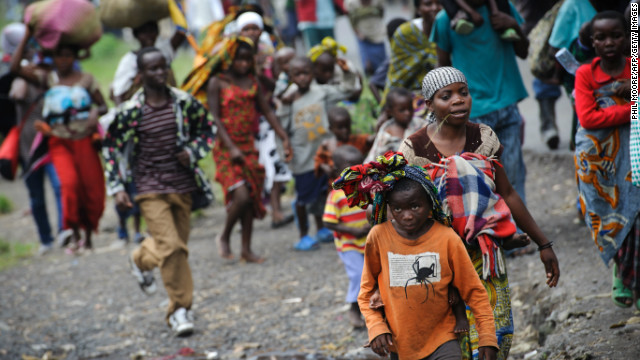 Thousands of Congolese flee the town of Sake, 26km west of Goma, on November 22, 2012.
Thousands of Congolese flee the town of Sake, 26km west of Goma, on November 22, 2012.
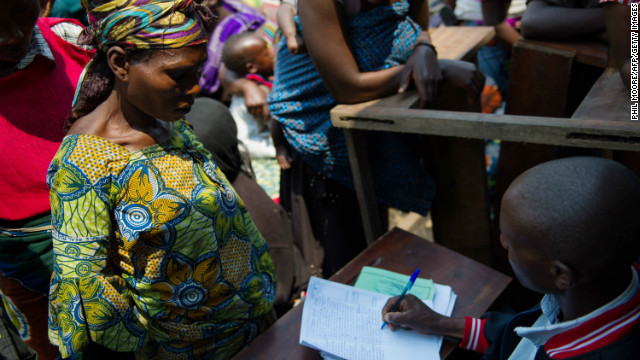 A displaced Congolese woman registers at a camp for displaced persons at Mugunga, 8km from the centre of Goma on November 22, 2012.
A displaced Congolese woman registers at a camp for displaced persons at Mugunga, 8km from the centre of Goma on November 22, 2012.
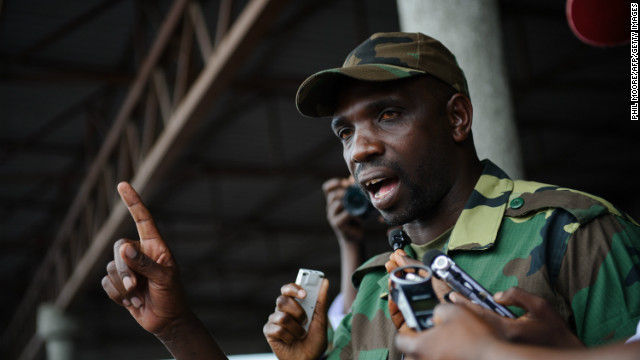 Spokesman of the M23 rebel group Lieutenant-Colonel Vianney Kazarama addresses a crowd at the Volcanoes Stadium in Goma on November 21, 2012.
Spokesman of the M23 rebel group Lieutenant-Colonel Vianney Kazarama addresses a crowd at the Volcanoes Stadium in Goma on November 21, 2012.
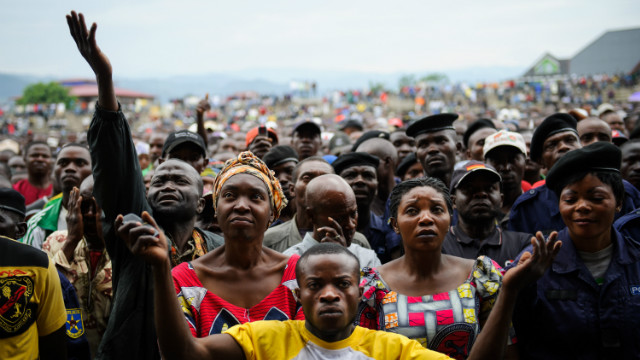 Residents of Goma listen to M23 rebel group spokesman at the Volcanoes Stadium in Goma on November 21, 2012.
Residents of Goma listen to M23 rebel group spokesman at the Volcanoes Stadium in Goma on November 21, 2012.
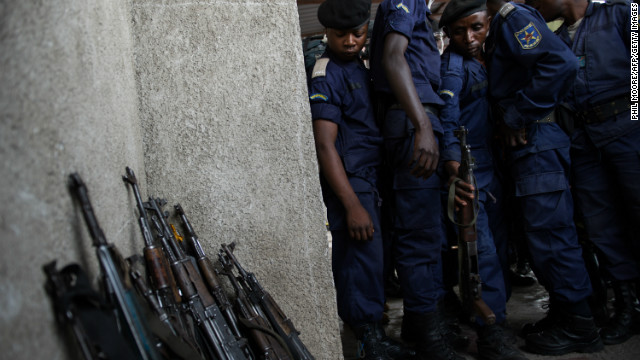 Surrendered police officers hand-in their weapons at the Volcanoes Stadium in Goma, in the east of the Democratic Republic of the Congo, on November 21, 2012.
Surrendered police officers hand-in their weapons at the Volcanoes Stadium in Goma, in the east of the Democratic Republic of the Congo, on November 21, 2012.
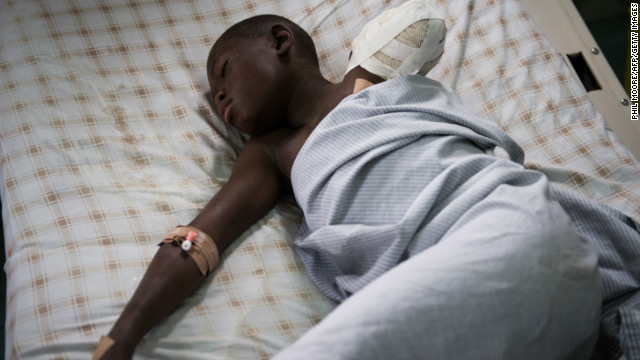 Twelve year old amputee Kakule Elie, hit by a stray bullet, lies in a bed in a hospital in Goma on November 20, 2012.
Twelve year old amputee Kakule Elie, hit by a stray bullet, lies in a bed in a hospital in Goma on November 20, 2012.
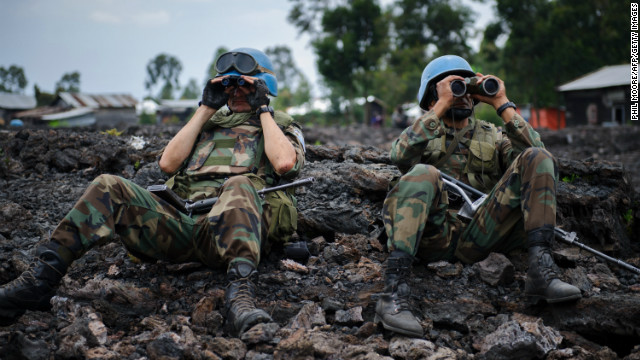 Uruguayan United Nations peacekeepers look through binoculars at M23 rebel positions on the outskirts of Goma.
Uruguayan United Nations peacekeepers look through binoculars at M23 rebel positions on the outskirts of Goma.
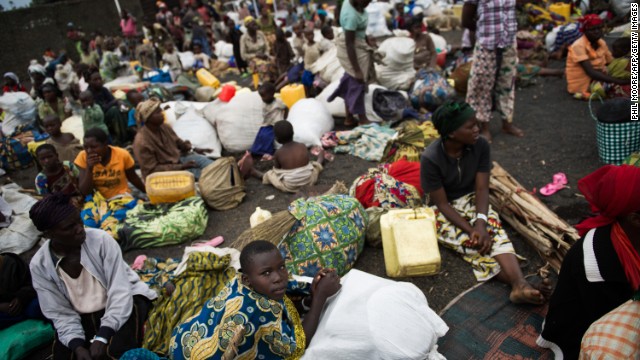 Displaced Congolese sit inside a United Nations base in Monigi, 5km from Goma, as they seek shelter after being forced to flee a temporary camp, on November 18, 2012.
Displaced Congolese sit inside a United Nations base in Monigi, 5km from Goma, as they seek shelter after being forced to flee a temporary camp, on November 18, 2012.
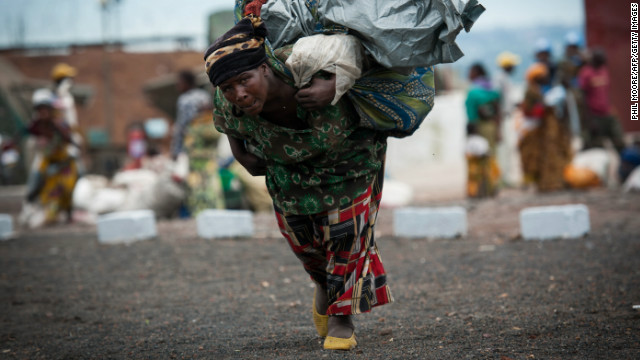 A displaced Congolese woman carries her belongings as she enters a United Nations base in Monigi, 5km from Goma on November 18, 2012.
A displaced Congolese woman carries her belongings as she enters a United Nations base in Monigi, 5km from Goma on November 18, 2012.












 Posted in
Posted in 
















